OTIS REDDING / “Otis Redding Mixtape”
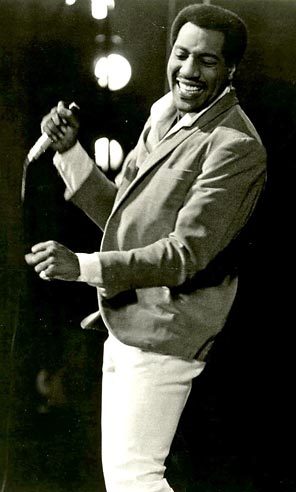 Everybody know the Big “O”—“(Sitting On) The Dock Of The Bay” and all. Even if folk can’t name one other song Otis wrote, they sure can sing “Sitting here resting my bones.”
So, because everybody knows, I’m not going to go through all the background stuff—yaknow, how he was from Macon, Georgia and was an icon of Stax Records. Well, actually Otis Ray Redding, Jr. was born in Dawson, Georgia on September 9, 1941 and Redding’s family moved to Macon when Otis was about five or so. Although many people consider him the personification of Southern R&B in the sixties, he was not a top-selling singer during his short lifetime.
In fact, “Dock Of The Bay,” his only number one hit, was recorded a mere three days before his death on December 10, 1967. Released after his death, “Dock of the Bay” not only was his only Billboard Number One hit, it is also reported to be the first posthumous song to top the Billboard charts.
Much of Redding’s most popular music was released after his death. The Immortal Otis Redding, arguably his best album and certainly my personal favorite, was one of five or six albums released after the plane crash in Madison, Wisconsin that resulted in Redding’s death when he was only 26 years old.
Everybody know the Big “O”—“(Sitting On) The Dock Of The Bay” and all. Even if folk can’t name one other song Otis wrote, they sure can sing “Sitting here resting my bones.”
So, because everybody knows, I’m not going to go through all the background stuff—yaknow, how he was from Macon, Georgia and was an icon of Stax Records. Well, actually Otis Ray Redding, Jr. was born in Dawson, Georgia on September 9, 1941 and Redding’s family moved to Macon when Otis was about five or so. Although many people consider him the personification of Southern R&B in the sixties, he was not a top-selling singer during his short lifetime.
In fact, “Dock Of The Bay,” his only number one hit, was recorded a mere three days before his death on December 10, 1967. Released after his death, “Dock of the Bay” not only was his only Billboard Number One hit, it is also reported to be the first posthumous song to top the Billboard charts.
Much of Redding’s most popular music was released after his death. The Immortal Otis Redding, arguably his best album and certainly my personal favorite, was one of five or six albums released after the plane crash in Madison, Wisconsin that resulted in Redding’s death when he was only 26 years old.
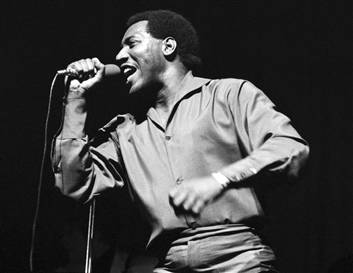 Redding’s popularity was based in large part on his legendary live performances. He was considered the most intense performance artist of his era, and that’s saying a lot considering that James Brown, Little Richard, The Motown crowd and Jimi Hendrix were all in their ascendancy in the mid-sixties. Indeed, Redding and Hendrix were both on the fabled Monterey Pop Festival line-up. That’s the show where Hendrix’s pyrotechnics included literally setting his guitar afire—for his part, Otis lit up the audience with the intensity of his 20-minute performance.
The film clips don’t lie. Otis Redding drove people into a frenzy. The orgasmic sexual subtext of every Redding performance was almost unbearable as the towering six-foot something, bear of man threw himself fully into each song not stopping until he had reached a peak of release and exhaustion.
Redding’s popularity was based in large part on his legendary live performances. He was considered the most intense performance artist of his era, and that’s saying a lot considering that James Brown, Little Richard, The Motown crowd and Jimi Hendrix were all in their ascendancy in the mid-sixties. Indeed, Redding and Hendrix were both on the fabled Monterey Pop Festival line-up. That’s the show where Hendrix’s pyrotechnics included literally setting his guitar afire—for his part, Otis lit up the audience with the intensity of his 20-minute performance.
The film clips don’t lie. Otis Redding drove people into a frenzy. The orgasmic sexual subtext of every Redding performance was almost unbearable as the towering six-foot something, bear of man threw himself fully into each song not stopping until he had reached a peak of release and exhaustion.
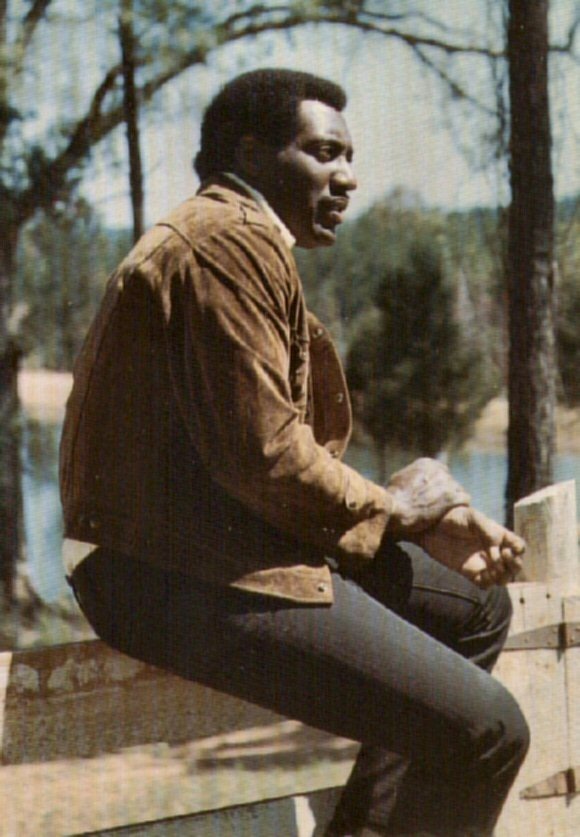 What was also interesting about Redding was his pride in his “country” roots. In the sixties the urban setting became the dominant focus of black culture and people newly arrived from the country usually attempted to assimilate as quickly as they could into urbane sophistication. Not Otis.
One of Otis’ most endearing songs is “Tramp,” a duet with Carla Thomas in which Otis revels in being country. Carla accuses his of being “country as the Georgia wood.” “That’s good” Otis rejoins, promising her he can get her anything she wants plus he’s “a lover.” There is humor a plenty in the song but there is also a focus on one of the major dynamics of black culture throughout the sixties: the migration of the Southern rural population to approximately 27 cities throughout the United States.
It’s all there in the music. Yes, Southern R&B, especially the Stax crew, was racially integrated in a way the music would not again be for a long, long time. The demise of Stax Records (an instructive and important story) marked the last time rural blacks had a major influence in the entertainment industry. In a sense, when Redding’s plane crashed into the icy waters of Lake Monona that effectively ended the ascendancy of rural blacks as major forces in the entertainment industry. After Redding, no major black performer proudly waved the flag of rural roots even though a large number of them did indeed have such roots.
Unlike most of his contemporaries who were rural born but moved to the city, Otis Redding remained a country man. Yes he flew in his own airplane but he also enjoyed living on his own ranch. Otis’ music reflected that down to earth attitude.
The importance of his country persona notwithstanding, there is an even more important connection to be realized. Rather than catalogue the songs and critique the performances, I’m attempting to connect a trio of cultural-context dots: Little Richard, Sam Cooke, Black Power. None of this trio may be initially obvious.
What was also interesting about Redding was his pride in his “country” roots. In the sixties the urban setting became the dominant focus of black culture and people newly arrived from the country usually attempted to assimilate as quickly as they could into urbane sophistication. Not Otis.
One of Otis’ most endearing songs is “Tramp,” a duet with Carla Thomas in which Otis revels in being country. Carla accuses his of being “country as the Georgia wood.” “That’s good” Otis rejoins, promising her he can get her anything she wants plus he’s “a lover.” There is humor a plenty in the song but there is also a focus on one of the major dynamics of black culture throughout the sixties: the migration of the Southern rural population to approximately 27 cities throughout the United States.
It’s all there in the music. Yes, Southern R&B, especially the Stax crew, was racially integrated in a way the music would not again be for a long, long time. The demise of Stax Records (an instructive and important story) marked the last time rural blacks had a major influence in the entertainment industry. In a sense, when Redding’s plane crashed into the icy waters of Lake Monona that effectively ended the ascendancy of rural blacks as major forces in the entertainment industry. After Redding, no major black performer proudly waved the flag of rural roots even though a large number of them did indeed have such roots.
Unlike most of his contemporaries who were rural born but moved to the city, Otis Redding remained a country man. Yes he flew in his own airplane but he also enjoyed living on his own ranch. Otis’ music reflected that down to earth attitude.
The importance of his country persona notwithstanding, there is an even more important connection to be realized. Rather than catalogue the songs and critique the performances, I’m attempting to connect a trio of cultural-context dots: Little Richard, Sam Cooke, Black Power. None of this trio may be initially obvious.
If it hadn't been for Little Richard, I would not be here. I entered the music business because of Richard - he is my inspiration. I used to sing like Little Richard, his Rock 'n' Roll stuff, you know. Richard has soul, too. My present music has a lot of him in it. —Otis ReddingLittle Richard is Macon’s most famous son (and if you don’t believe it, ask him and he’ll tell you!). “Shout Bamalama,” the opening track on the mixtape makes Otis’ Little Richard lineage obvious.
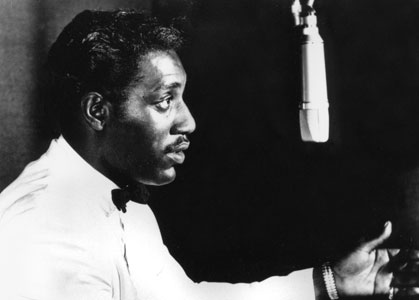 Otis covered a wider swath of Sam Cooke’s material than did any of Redding’s contemporaries. I believe there was much more to it than Otis’ love of Cooke’s music. The something more was the confluence of social outlooks.
Sam Cooke had started his own record label and had begun organizing black artists on the West Coast. James Brown testifies on film and in his autobiography that much like Cooke, Otis Redding was trying to organize black artists to seize economic control of their music.
Otis covered a wider swath of Sam Cooke’s material than did any of Redding’s contemporaries. I believe there was much more to it than Otis’ love of Cooke’s music. The something more was the confluence of social outlooks.
Sam Cooke had started his own record label and had begun organizing black artists on the West Coast. James Brown testifies on film and in his autobiography that much like Cooke, Otis Redding was trying to organize black artists to seize economic control of their music.
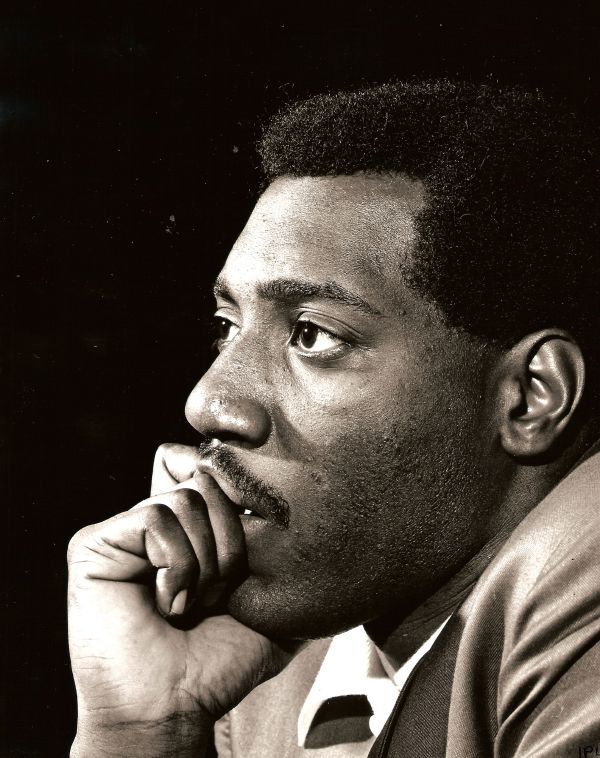 Redding represented a political strain of the black musical fabric which is ever present but which is usually ignored or minimized by the mainstream: self-determination. In the sixties the popular phrase was “Nationtime”—time to get up and become, time to do for self, or as James Brown put it “own some land and be like the man.” Ever since Scott Joplin back in the late 1880’s black musicians have attempted to gain economic and political control of the music they produced. Otis Redding was simply another manifestation of that long lineage.
Black music has always been a money maker but at the same time black musicians have seldom made a major share of the money their music produced. If black musicians were to earn their fair share it would mean that some forces would have to give up a significant portion of their, ahhh, shall we say “unearned income.” We are not talking about pennies or a few thousand here and there. The music industry is a multi-million dollar enterprise. If you saw the movie The Godfather, you saw the mafia making a decision to so-called “go legit.”
Redding represented a political strain of the black musical fabric which is ever present but which is usually ignored or minimized by the mainstream: self-determination. In the sixties the popular phrase was “Nationtime”—time to get up and become, time to do for self, or as James Brown put it “own some land and be like the man.” Ever since Scott Joplin back in the late 1880’s black musicians have attempted to gain economic and political control of the music they produced. Otis Redding was simply another manifestation of that long lineage.
Black music has always been a money maker but at the same time black musicians have seldom made a major share of the money their music produced. If black musicians were to earn their fair share it would mean that some forces would have to give up a significant portion of their, ahhh, shall we say “unearned income.” We are not talking about pennies or a few thousand here and there. The music industry is a multi-million dollar enterprise. If you saw the movie The Godfather, you saw the mafia making a decision to so-called “go legit.”
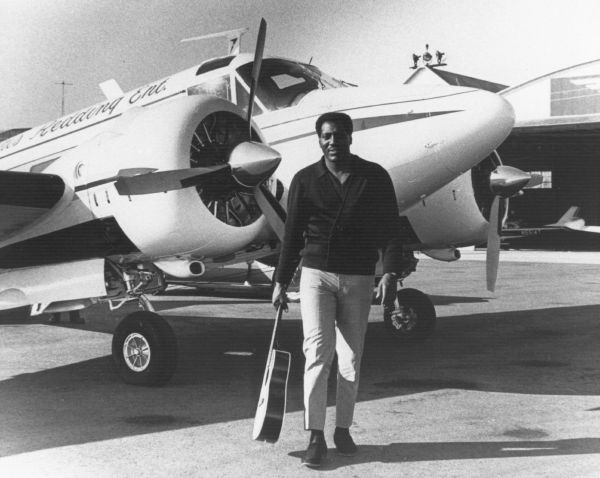 Entertainment with its ties to liquor, drugs and prostitution was one of the major areas into which the mafia moved.
Here is where the connections become speculative. Both Cooke and Redding died mysterious deaths. Cooke was shot and murdered—not only has no killer ever been identified but the circumstances of Cooke’s death remain shrouded in near total mystery. The cause of Redding’s plane crash likewise has never been ascertained. Redding owned his own Beechcraft 18 airplane, which he used to keep up his heavy touring schedule.
The Negro Conspiracy Association (North American Division) insists that both men were the victims of mafia assassinations. At this point the hard evidence evaporates and conjecture takes over…
Entertainment with its ties to liquor, drugs and prostitution was one of the major areas into which the mafia moved.
Here is where the connections become speculative. Both Cooke and Redding died mysterious deaths. Cooke was shot and murdered—not only has no killer ever been identified but the circumstances of Cooke’s death remain shrouded in near total mystery. The cause of Redding’s plane crash likewise has never been ascertained. Redding owned his own Beechcraft 18 airplane, which he used to keep up his heavy touring schedule.
The Negro Conspiracy Association (North American Division) insists that both men were the victims of mafia assassinations. At this point the hard evidence evaporates and conjecture takes over…
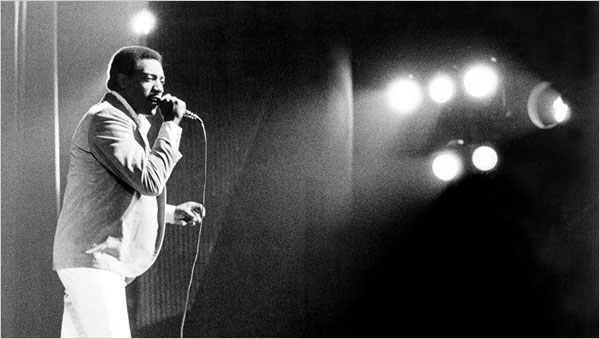 While the facts may be forever enshrouded in mystery, fortunately we don’t need hard facts to enjoy Otis’ music.
—Kalamu ya Salaam
Otis Redding Mixtape Playlist
While the facts may be forever enshrouded in mystery, fortunately we don’t need hard facts to enjoy Otis’ music.
—Kalamu ya Salaam
Otis Redding Mixtape Playlist
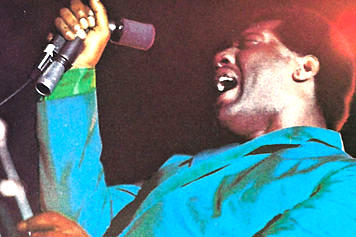 If you’re just starting to collect Otis Redding recordings, you have three options: 1. Otis! The Definitive Otis Redding , a 4-CD box set. 2. Choose Dreams to Remember: The Otis Redding Anthology, a 2-CD set that includes all the essential tracks. 3. Start your collection with selected albums. I strongly recommend option number one because not only do you get a ton of Otis Redding music, you also get a companion booklet that is replete with interesting information and photogrpahs.
01 “Shout Bamalama” - Otis! The Definitive Otis Redding
02 “Shake” - Otis! The Definitive Otis Redding
03 “Chain Gang” - Otis! The Definitive Otis Redding
04 “Tramp” - Otis! The Definitive Otis Redding
05 “Hucklebuck” - Otis! The Definitive Otis Redding
06 “Hard To Handle” - Otis! The Definitive Otis Redding
07 “A Waste Of Time” - The Immortal Otis Redding
08 “A Woman, A Lover, A Friend” - Sings Soul Ballads
09 “For Your Precious Love” - Sings Soul Ballads
10 “My Girl” - Otis Blue: Otis Redding Sings Soul
11 “The Happy Song ( Dum-Dum-De-De)” - The Immortal Otis Redding
12 “You've Made A Man Out Of Me” - The Immortal Otis Redding
13 “I've Been Loving You Too Long” - Otis! The Definitive Otis Redding
14 “Think About It” - The Immortal Otis Redding
15 “Cigarettes And Coffee” - Otis! The Definitive Otis Redding
16 “My Lover's Prayer” - Otis! The Definitive Otis Redding
17 “Mr. Pitiful” - Otis! The Definitive Otis Redding
18 “Ole Man Trouble” - Otis! The Definitive Otis Redding
19 “Change Is Gonna Come” - Otis Blue: Otis Redding Sings Soul
20 “Dock Of The Bay” - Otis! The Definitive Otis Redding
21 “I've Got Dreams To Remember” - The Immortal Otis Redding
22 “Down In The Valley” - Otis Blue: Otis Redding Sings Soul
23 “Fa-Fa-Fa-Fa-Fa (Sad Song)” - Otis! The Definitive Otis Redding
24 “Announcement” - Otis! The Definitive Otis Redding
25 “Wonderful World” - Otis Blue: Otis Redding Sings Soul
26 “You Don't Miss Your Water” - Otis Blue: Otis Redding Sings Soul
27 “Open The Door” - Otis! The Definitive Otis Redding
28 “Nobody's Fault But Mine” - The Immortal Otis Redding
29 “When Something Is Wrong With My Baby” - King & Queen, Otis Redding & Carla Thomas
30 “Are You Lonely For Me Baby” - King & Queen, Otis Redding & Carla Thomas
31 “Tell It Like It Is” - King & Queen, Otis Redding & Carla Thomas
32 “New Year's Resolution” - King & Queen, Otis Redding & Carla Thomas
33 “Try a Little Tenderness” - Live in London and Paris
If you’re just starting to collect Otis Redding recordings, you have three options: 1. Otis! The Definitive Otis Redding , a 4-CD box set. 2. Choose Dreams to Remember: The Otis Redding Anthology, a 2-CD set that includes all the essential tracks. 3. Start your collection with selected albums. I strongly recommend option number one because not only do you get a ton of Otis Redding music, you also get a companion booklet that is replete with interesting information and photogrpahs.
01 “Shout Bamalama” - Otis! The Definitive Otis Redding
02 “Shake” - Otis! The Definitive Otis Redding
03 “Chain Gang” - Otis! The Definitive Otis Redding
04 “Tramp” - Otis! The Definitive Otis Redding
05 “Hucklebuck” - Otis! The Definitive Otis Redding
06 “Hard To Handle” - Otis! The Definitive Otis Redding
07 “A Waste Of Time” - The Immortal Otis Redding
08 “A Woman, A Lover, A Friend” - Sings Soul Ballads
09 “For Your Precious Love” - Sings Soul Ballads
10 “My Girl” - Otis Blue: Otis Redding Sings Soul
11 “The Happy Song ( Dum-Dum-De-De)” - The Immortal Otis Redding
12 “You've Made A Man Out Of Me” - The Immortal Otis Redding
13 “I've Been Loving You Too Long” - Otis! The Definitive Otis Redding
14 “Think About It” - The Immortal Otis Redding
15 “Cigarettes And Coffee” - Otis! The Definitive Otis Redding
16 “My Lover's Prayer” - Otis! The Definitive Otis Redding
17 “Mr. Pitiful” - Otis! The Definitive Otis Redding
18 “Ole Man Trouble” - Otis! The Definitive Otis Redding
19 “Change Is Gonna Come” - Otis Blue: Otis Redding Sings Soul
20 “Dock Of The Bay” - Otis! The Definitive Otis Redding
21 “I've Got Dreams To Remember” - The Immortal Otis Redding
22 “Down In The Valley” - Otis Blue: Otis Redding Sings Soul
23 “Fa-Fa-Fa-Fa-Fa (Sad Song)” - Otis! The Definitive Otis Redding
24 “Announcement” - Otis! The Definitive Otis Redding
25 “Wonderful World” - Otis Blue: Otis Redding Sings Soul
26 “You Don't Miss Your Water” - Otis Blue: Otis Redding Sings Soul
27 “Open The Door” - Otis! The Definitive Otis Redding
28 “Nobody's Fault But Mine” - The Immortal Otis Redding
29 “When Something Is Wrong With My Baby” - King & Queen, Otis Redding & Carla Thomas
30 “Are You Lonely For Me Baby” - King & Queen, Otis Redding & Carla Thomas
31 “Tell It Like It Is” - King & Queen, Otis Redding & Carla Thomas
32 “New Year's Resolution” - King & Queen, Otis Redding & Carla Thomas
33 “Try a Little Tenderness” - Live in London and Paris
This entry was posted on Monday, July 27th, 2009 at 6:16 am and is filed under Classic. You can follow any responses to this entry through the RSS 2.0 feed. You can leave a response, or trackback from your own site.
3 Responses to “OTIS REDDING / “Otis Redding Mixtape””
July 27th, 2009 at 8:08 am
Otis – truly a son of the south with Georgia red clay dirt in his bones, in his bones. Thanks for giving us a taste of Otis’ essence. The man is tough and unbelievably tender – at the same time.
The Georgia Music Hall of Fame in Macon had a world class exhibit on Otis last year. I’m not sure if it is still up – they are struggling financially and may have to close soon. But if you’re in the metro ATL area, it is worth a trip down the road in Macon to visit the Hall of Fame – one GA institution that gives appropriate credit to the black and white roots of Georgia culture. And while you’re down there, stop by the Harriet Tubman museum and the Douglass Theatre.
July 27th, 2009 at 6:12 pm
Thank you, thank you … ! This is music heaven to me. The only thing I miss from this list is “Respect.”
July 29th, 2009 at 1:15 pm
Thanks for this. This gives me an appreciation for my…uhm…parents music. LOL! I remember hearing these songs in the house. Good music. Future generations have a lot to learn when it comes to soul. Anthony Hamilton at his best even pales in comparison. This isn’t a dig, but shows the force that soul that can be felt in this music.
I liked all of the tracks. ‘Announcement’ threw me off a bit.
Leave a Reply
| top |